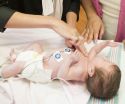(Press-News.org) Mandatory targets to reduce salt in processed food would help tackle inequalities in coronary heart disease that lead to excess deaths in deprived areas of England, according to research by the University of Liverpool.
Consuming high amounts of salt causes high blood pressure which increases the risk of cardiovascular disease. Current average UK salt intakes are around eight grams per adult per day, whilst the UK government recommends less than six grams per day. Individuals living in more deprived areas of England often consume larger amounts of salt, and this contributes to additional deaths from heart disease.
Researchers from the University's Department of Public Health and Policy compared the effects of voluntary and mandatory salt reduction policies. They used a model that incorporated expert forecasts of future policy implementation (for example, the reduction of salt in processed foods) and combined these with data from national health surveys and evidence linking salt consumption to the risk of heart disease.
The researchers calculated the benefits if regulations were introduced triggering the reformulation of food products to reduce the amount of salt they contained. They estimated that approximately 4,500 cardiac deaths might be postponed or prevented by 2025, with the greatest benefits occurring in the most deprived groups.
However, if the food industry was only asked to voluntarily reduce salt levels - by continuing the Public Health Responsibility Deal - then smaller product reformulations would occur and only around 1,500 cardiac deaths might be prevented. Improved nutrition labelling and health education might avoid only about 500 cardiac deaths.
Furthermore, there would be no additional benefits for deprived consumers who might not buy the products that were reformulated or labelled.
Dr Duncan Gillespie, who conducted the research said: "Our research suggests that mandatory targets to reduce the salt hidden in processed foods could substantially reduce heart disease deaths, especially in deprived areas and is much more powerful than voluntary schemes for reduction or labelling."
Dr Gillespie added: "Unhealthy diets are concentrated in the more deprived parts of society and these groups are also at the greatest risk of disease, and so the problem with public health policy is making sure it reaches more deprived individuals."
The research also indicates that the reductions in the unequal distribution of cardiac deaths across levels of deprivation from product reformulation to reduce salt would be greater among adults less than 75 years of age, where inequalities are currently widest.
INFORMATION:
The research is published in the journal PLOS ONE and was funded by the National Institute for Health Research School for Public Health Research (NIHR SPHR).
Dr Gillespie is now a Research Associate at the University of Sheffield's School of Health and Related Research.
Notes to editors:
1. The University of Liverpool is one of the UK's leading research institutions with an annual turnover of £435 million, including £114 million for research. Liverpool is ranked in the top 1% of higher education institutions worldwide and is a member of the Russell Group. Visit http://www.liv.ac.uk or follow us on twitter at: http://www.twitter.com/livuninews
2. The National Institute for Health Research (NIHR) is funded by the Department of Health to improve the health and wealth of the nation through research. Since its establishment in April 2006, the NIHR has transformed research in the NHS. It has increased the volume of applied health research for the benefit of patients and the public, driven faster translation of basic science discoveries into tangible benefits for patients and the economy, and developed and supported the people who conduct and contribute to applied health research. The NIHR plays a key role in the Government's strategy for economic growth, attracting investment by the life-sciences industries through its world-class infrastructure for health research. Together, the NIHR people, programmes, centres of excellence and systems represent the most integrated health research system in the world. For further information, visit the NIHR website
3. The School for Public Health Research (SPHR) is funded by the National Institute for Health Research (NIHR). SPHR is a partnership between the Universities of Sheffield, Bristol, Cambridge, Exeter, UCL; The London School for Hygiene and Tropical Medicine; the LiLaC collaboration between the Universities of Liverpool and Lancaster and Fuse; The Centre for Translational Research in Public Health, a collaboration between Newcastle, Durham, Northumbria, Sunderland and Teesside Universities. For further information, please visit http:sphr.nihr.ac.uk
Researchers at the Hanover Centre for Optical Technologies (HOT), University of Hanover, Germany, have developed a self-contained fiber optic sensor for smartphones with the potential for use in a wide variety of biomolecular tests, including those for detecting pregnancy or monitoring diabetes. The readings of the sensor can run through an application on a smartphone which provide real-time results. When properly provisioned, the smartphone-user has the ability to monitor multiple types of body fluids, including: blood, urine, saliva, sweat or breath. In case of medical ...
BOSTON - Hospitals have made significant strides to reduce or eliminate physical harm to patients since the landmark 1999 Institute of Medicine Report "To Err is Human." In a new paper published in BMJ, patient care leaders at Beth Israel Deaconess Medical Center (BIDMC) say hospitals must now devote similar attention to eliminating emotional harms that damage a patient's dignity and can be caused by a failure to demonstrate adequate respect for the patient as a person.
"Emotional harms can erode trust, leave patients feeling violated and damage patient-provider relationships," ...
LAWRENCE -- A new study that is the first to use Social Security Administration's personal income tax data tracking the same individuals over 20 years to measure individual lifetime earnings has confirmed significant long-term economic benefits of college education.
ChangHwan Kim, a University of Kansas researcher, said the research team was also able to account for shortcomings in previous studies by including factors such as gender, race, ethnicity, place of birth and high school performance that would influence a person's lifetime earnings and the probability of college ...
A study by City College of New York physicists Flaviano Morone and Hernán A. Makse suggests that "smaller is smarter" when it comes to influential superspreaders of information in social networks. This is a major shift from the widely held view that "bigger is better," and could have important consequences for a broad range of social, natural and living networked systems.
"The problem of identifying the minimal set of influential nodes in complex networks for maximizing viral marketing in social media, optimizing immunization campaigns and protecting networks under ...
ROCHESTER, Minn. - Opioid painkiller addiction and accidental overdoses have become far too common across the United States. To try to identify who is most at risk, Mayo Clinic researchers studied how many patients prescribed an opioid painkiller for the first time progressed to long-term prescriptions. The answer: 1 in 4. People with histories of tobacco use and substance abuse were likeliest to use opioid painkillers long-term.
The findings are published in the July issue of the medical journal Mayo Clinic Proceedings.
While the study identified past or present nicotine ...
Premature babies are at an increased risk for developing autism spectrum disorder. But a small study indicates that preemies who avoid eye contact in early infancy are less likely to demonstrate symptoms of autism at age 2 than preemies who maintain eye contact during early interactions, according to new research at Washington University School of Medicine in St. Louis.
"Children with autism typically have challenges with social interaction and may avoid eye contact, but it turned out that children in this study who had characteristics of autism at age 2 were more likely ...
ROSEMONT, Ill.--Participation in sports by women and girls has increased from 310,000 individuals in 1971 to 3.37 million in 2010. At the same time, sports-related injuries among female athletes have skyrocketed. According to a new study in the Journal of the American Academy of Orthopaedic Surgeons (JAAOS), women with symptoms known as the "female athlete triad" are at greater risk of bone stress injuries and fractures.
"The female athlete triad is a spectrum of symptoms that include low energy availability, menstrual cycle abnormalities, and low bone mineral density. ...
There may be far fewer galaxies further out in the universe then might be expected, according to a new study led by Michigan State University.
Over the years, the Hubble Space Telescope has allowed astronomers to look deep into the universe. The long view stirred theories of untold thousands of distant, faint galaxies. The new research, appearing in the current issue of the Astrophysical Journal Letters, however, offers a theory that reduces the estimated number of the most distant galaxies by 10 to 100 times.
"Our work suggests that there are far fewer faint galaxies ...
People have evolved to be smarter and taller than their predecessors, a study of populations around the world suggests.
Those who are born to parents from diverse genetic backgrounds tend to be taller and have sharper thinking skills than others, the major international study has found.
Researchers analysed health and genetic information from more than 100 studies carried out around the world. These included details on more than 350,000 people from urban and rural communities.
The team found that greater genetic diversity is linked to increased height. It is also ...
The European Space Agency's Rosetta spacecraft first began orbiting comet 67P/Churyumov-Gerasimenko in August 2014. Almost immediately, scientists began to wonder about several surprisingly deep, almost perfectly circular pits on the comet's surface. Now, a new study based on close-up imagery taken by Rosetta suggests that these pits are sinkholes, formed when ices beneath the comet's surface sublimate, or turn directly to gas.
The study, which appears in the July 2, 2015 issue of the journal Nature, reveals that the surface of 67P/Churyumov-Gerasimenko is variable and ...


